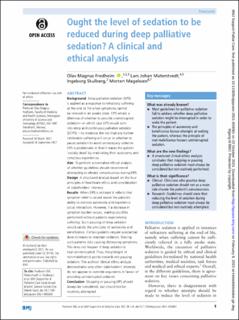| dc.contributor.author | Fredheim, Olav Magnus | |
| dc.contributor.author | Materstvedt, Lars Johan | |
| dc.contributor.author | Skulberg, Ingeborg M | |
| dc.contributor.author | Magelssen, Morten | |
| dc.date.accessioned | 2022-02-11T13:16:53Z | |
| dc.date.available | 2022-02-11T13:16:53Z | |
| dc.date.created | 2021-11-07T23:21:57Z | |
| dc.date.issued | 2021 | |
| dc.identifier.issn | 2045-435X | |
| dc.identifier.uri | https://hdl.handle.net/11250/2978505 | |
| dc.description.abstract | Background Deep palliative sedation (DPS) is applied as a response to refractory suffering at the end of life when symptoms cannot be relieved in an awake state. DPS entails a dilemma of whether to provide uninterrupted sedation—in which case DPS would turn into deep and continuous palliative sedation (DCPS) —to minimise the risk that any further intolerable suffering will occur or whether to pause sedation to avoid unnecessary sedation. DPS is problematic in that it leaves the patient ‘socially dead’ by eradicating their autonomy and conscious experiences. Aim To perform a normative ethical analysis of whether guidelines should recommend attempting to elevate consciousness during DPS. Design A structured analysis based on the four principles of healthcare ethics and consideration of stakeholders’ interests. Results When DPS is initiated it reflects that symptom relief is valued above the patient’s ability to exercise autonomy and experience social interaction. However, if a decrease in symptom burden occurs, waking could be performed without patients experiencing suffering. Such pausing of deep sedation would satisfy the principles of autonomy and beneficence. Certain patients require substantial dose increases to maintain sedation. Waking such patients risks causing distressing symptoms. This does not happen if deep sedation is kept uninterrupted. Thus, the principle of non-maleficence points towards not pausing sedation. The authors’ clinical ethics analysis demonstrates why other stakeholders’ interests do not appear to override arguments in favour of providing uninterrupted sedation. Conclusion Stopping or pausing DPS should always be considered, but should not be routinely attempted. | en_US |
| dc.language.iso | eng | en_US |
| dc.publisher | BMJ Publishing Group | en_US |
| dc.relation.uri | https://spcare.bmj.com/content/early/2021/10/21/bmjspcare-2021-003081.long | |
| dc.rights | Navngivelse-Ikkekommersiell 4.0 Internasjonal | * |
| dc.rights | Navngivelse-Ikkekommersiell 4.0 Internasjonal | * |
| dc.rights.uri | http://creativecommons.org/licenses/by-nc/4.0/deed.no | * |
| dc.title | Ought the level of sedation to be reduced during deep palliative sedation? A clinical and ethical analysis | en_US |
| dc.type | Peer reviewed | en_US |
| dc.type | Journal article | en_US |
| dc.description.version | publishedVersion | en_US |
| dc.source.journal | BMJ Supportive & Palliative Care | en_US |
| dc.identifier.doi | 10.1136/bmjspcare-2021-003081 | |
| dc.identifier.cristin | 1952130 | |
| cristin.ispublished | true | |
| cristin.fulltext | original | |
| cristin.qualitycode | 1 | |

